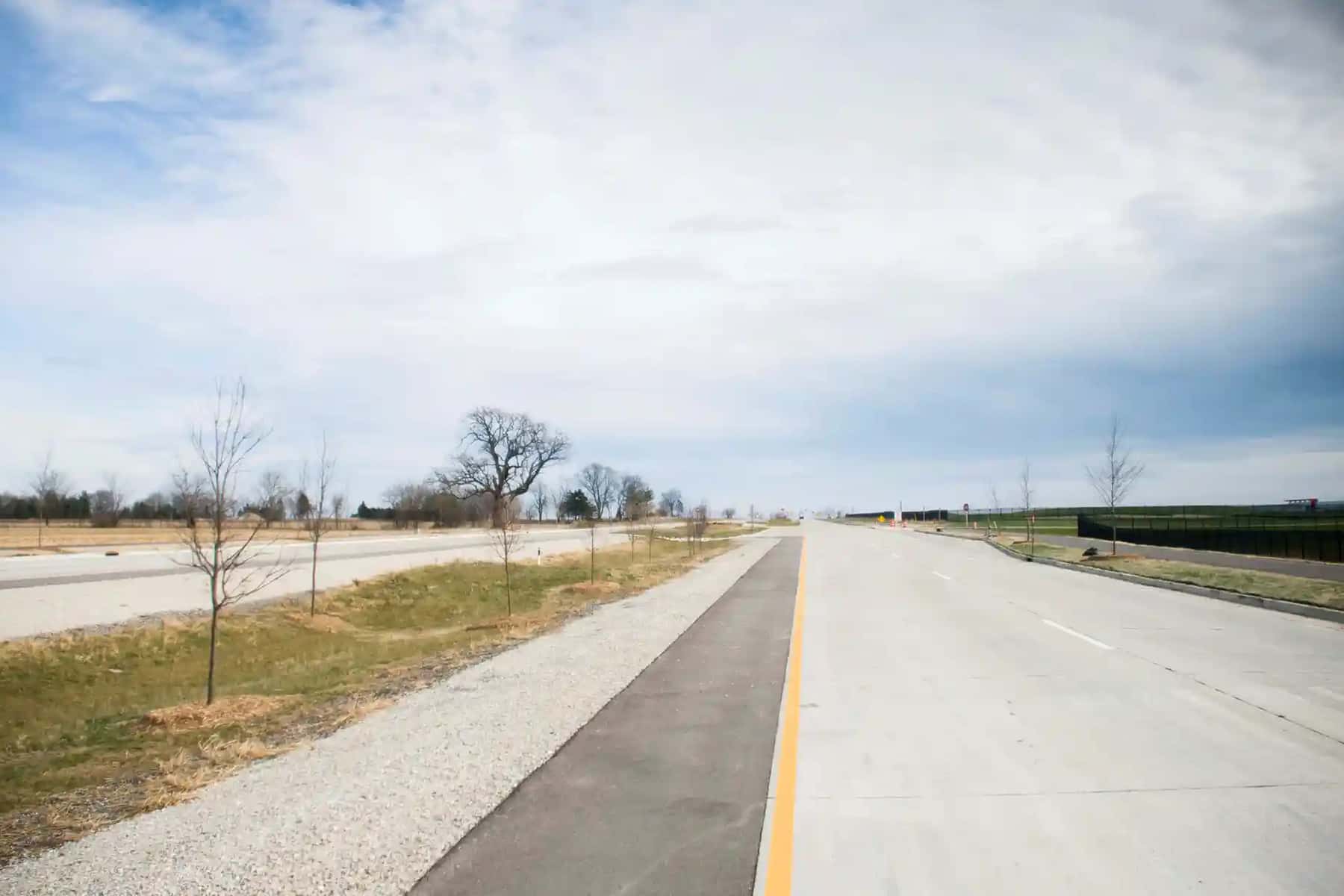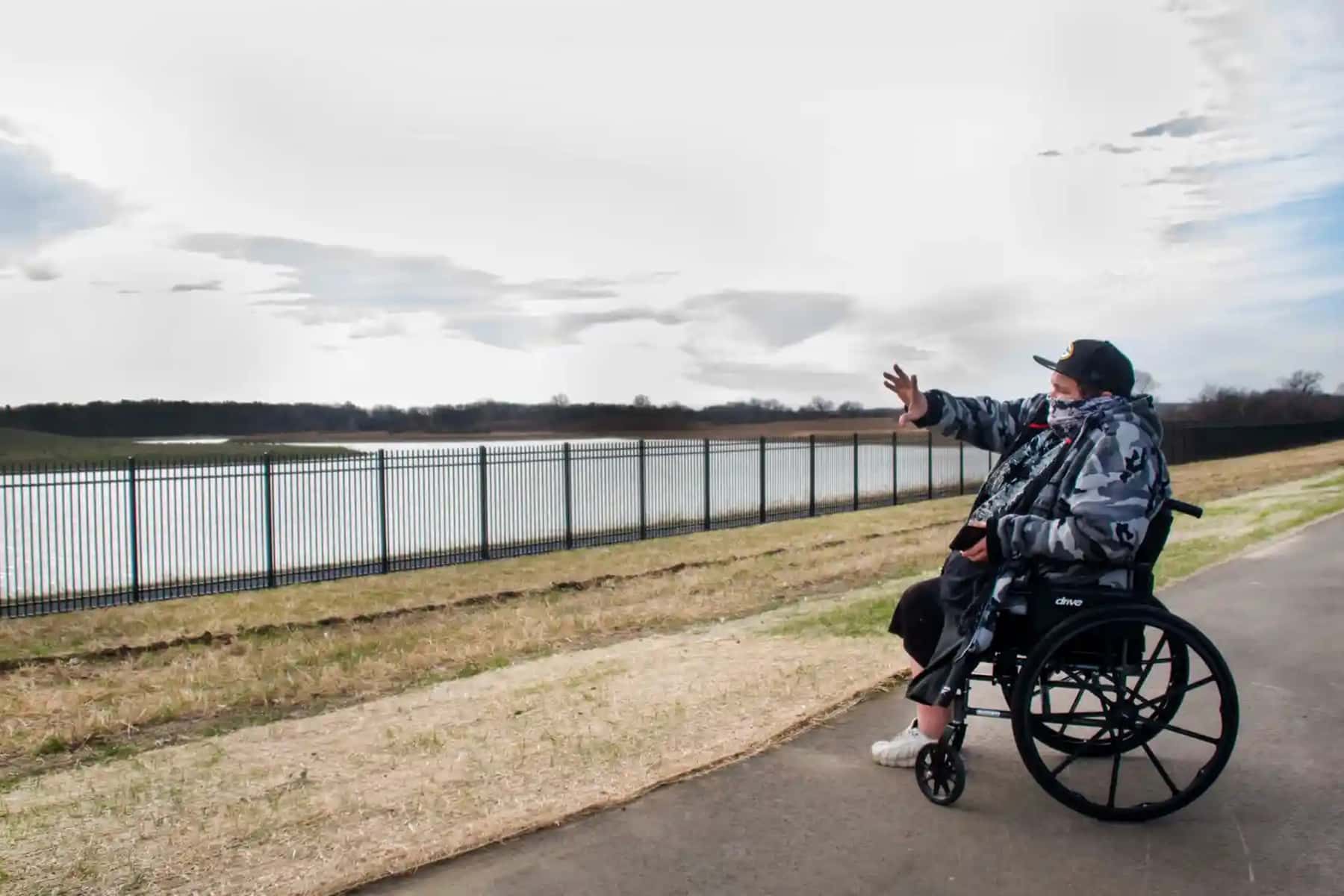
In Mount Pleasant, Wisconsin, families were forced out for a huge hi-tech plant – but three years later, it still has not been built.
When Sean McFarlane recently returned to the site where his lifelong home was demolished, he found in its place a retention pond and hundreds of geese perched on a hill.
The quiet scene came as a shock. The Wisconsin village of Mount Pleasant had effectively forced him, his girlfriend and four children from their home in 2017 to make way for a proposed 20m sq ft hi-tech plant owned by the Taiwanese electronics giant Foxconn, a plant Donald Trump had said would soon be the “eighth wonder of the world.”
To make way for this “wonder,” village officials temporarily placed the McFarlanes in a dilapidated vacant house with no working toilets or heat, then allegedly failed to meet the promised relocation payment of $22,000.
Three years later, the factory for which the family went through hell has not been built. Sitting in his wheelchair on an empty sidewalk in November, McFarlane sighed in disbelief as he scanned the vast patchwork of mud, open fields, ponds and a few underutilized buildings comprising the 3,000-acre Foxconn site.
“They demolished my house for this? A bunch of geese that sit on a hill?” McFarlane, 37, asked. “It’s upsetting. That’s where my old house was, and now it’s just nothing. You know? Nothing.”
In 2017, Mount Pleasant officials had used the promise of 13,000 jobs and $10bn in private investment by 2023 as justification for forcing hundreds of residents from their homes and turning the property over to Foxconn. Officials vowed to transform the sleepy rural village into a bustling, hi-tech hub for manufacturing known as “Wisconn Valley” – a promise that appealed to many in the state who have suffered as traditional manufacturing jobs have disappeared.
Instead, the project imploded in slow motion. Few jobs have materialized and Foxconn has not submitted new construction plans in over a year. The LCD screens that were supposed to be made there are not being built in its “factory,” which is 20 times smaller than proposed and now zoned as “storage.” After Foxconn failed to meet its job creation targets, Wisconsin’s governor, Tony Evers, last month pulled a deal that would have handed the company nearly $4.5bn in incentives for completing its plans.
While Mount Pleasant residents are frustrated, they have largely directed their anger at local leaders. They said that the village waged a dirty war against its constituents in which it issued dubious eminent domain orders – a process by which the government takes private land for public use – and used other tactics designed to drive them out of their homes.
Village leaders upended lives in the name of acquiring property for the company, residents said. Some continue to fight for their land while others took inadequate relocation packages and left. A few saw their homes seized by the village.
“There was a bit of evilness to all of this,” said Kelly Gallaher, a Mount Pleasant resident and vocal critic of the project. “The kind of things they pulled really did traumatize a lot of people.”
Meanwhile, the village is running up nearly $1bn in debt to fund the property acquisitions and new infrastructure that continues being built even as Foxconn’s plans fizzle.
Pristine new four- and six-lane highways now border and bisect the site’s fields. Village leadership claimed autonomous vehicles would fill the roads, but green John Deere tractors were among the few vehicles in sight on a recent afternoon. Many view nearly $320m in water, sewage and electric upgrades that ratepayers must shoulder as unnecessary for the site’s four underused buildings. And earlier this year, Mount Pleasant began leasing farmland it purchased back to farmers.
In a statement to the Guardian, Claude Lois, a village consultant hired to manage the project, wrote that Mount Pleasant “worked diligently to secure voluntary agreements with property owners … and has succeeded in doing so in the vast majority of cases.” The Mount Pleasant village president, Dave DeGroot, did not respond to a request for comment, but in September told the Racine Journal Times he’s “thrilled” with the progress and called for patience on a project that will now take “decades” to complete.
But as he took pictures of the long, empty sidewalk and highway, McFarlane said he had none of that patience left. “The roads were supposed to be for 13,000 workers but no one is here,” he said. “What is this sidewalk for? I don’t understand it. It’s the sidewalk to nowhere.”
‘They’ll leave you on an island’
In early 2017, Kim Mahoney’s family left their home in a noisy city in the state for a three-bedroom house they built in an agricultural preserve in Mount Pleasant that “felt like a park.” Eight months later, that dramatically changed.
The village notified her subdivision’s residents that it would use eminent domain to seize their homes if they did not accept a relocation offer. But Mahoney and others claim the orders were “illegal.” Instead, the questionable orders seemed to be a cunning attempt by Mount Pleasant’s “acquisitions team” to scare residents into selling their property.
The mere prospect of a fight over complex eminent domain laws convinced most residents that they “had no choice” but to accept the village’s offers, Mahoney said. “You feel like you’re up against Goliath.”
While state law allows municipalities to use eminent domain to seize property to widen roads, Mount Pleasant in many cases wrongfully claimed that it would need to demolish properties’ homes, even if they sat outside the area needed for road widening. Village leadership also threatened to prohibit residents from connecting driveways to widened roads, which it lacks the authority to do.
Though the village acquisitions team conceded its statute did not apply to their home, Mahoney said, an official continued threatening the family: “Foxconn is still going to want your property. They’ll leave you on an island.”
Mahoney stressed that her family was always willing to sell for a fair price that would cover the cost of rebuilding, but the village refused to negotiate. Now Foxconn’s few buildings – including one called “The Globe” that Mahoney described as “a crazy-looking disco ball sitting on a pedestal” – are the family’s only neighbors.
Mount Pleasant took a similar approach across the Foxconn site, including when it tried to force out the owners of a 400-acre pumpkin farm. The Creuziger family sued, and their attorney, Dan Bach, said the village “quickly retreated.” If the Foxconn project ever materializes, it may have to be built around the pumpkin patch.
In other cases, the village appeared to be drawing road plans that would change or disappear once a homeowner sold their property. When those measures failed, the village declared the entire Foxconn site – including the Mahoney’s newly built home – “blighted,” which Mahoney dismissed as another scare tactic.
While some families won their battles with the village, the fight took an unimaginable mental toll, said Mahoney, who started using sleeping pills and blood pressure medication to deal with the stress.
“My brain wouldn’t shut off trying to figure out, ‘How do I fix this?’” she said. “The frustrating part is that there’s nothing I can do about it.”
‘I felt like a stupid dummy for trusting them’
Before the Foxconn proposal, McFarlane, who lost a leg in a car accident, rented a house that was owned by his mother and had been tailored to be wheelchair-accessible. Three years later, he still does not have an accessible shower in his new home in neighboring Caledonia, and the family, which largely relies on disability payments, is out of renovation money.
McFarlane’s difficult situation illustrates how families that received inadequate relocation packages still have not been able to fully rebuild their lives. While the village paid landowners up to 10 times the value of their empty parcels, homeowners were only given 1.4 times the value of their homes, and the village issued the assessment.
Mount Pleasant offered a relocation payment of $22,000 to McFarlane, who was a renter, and over $500,000 to his mother, Sherri Shaver, who was a homeowner. It also housed McFarlane temporarily in a village-owned home, and the family was shocked to discover as they moved in that it had sat vacant for several years. Aside from no heat or working toilets, it had been vandalized, had three feet of water in the basement, was mold infested, had doorways that were too small for McFarlane’s wheelchair, and its sinks spit out tainted water that left rashes on his kids’ skin.
Then the situation took another ugly turn: Mount Pleasant’s leadership withdrew its offer for McFarlane’s payment, he said, and threatened to sue Shaver over an unrelated matter if he fought them. Despite tearfully pleading for the money before the Mount Pleasant board of trustees, the relocation payment never arrived. McFarlane said he was told by village officials that the payment to his mother was enough for the entire family.
“There’s no explanation for why they did it, except that they could, and I felt like a stupid dummy for trusting them,” McFarlane said. “I don’t know why I did. I feel like I let my family down.”
Still, McFarlane said he was grateful to be starting fresh in a new town.
“I’m just glad we’re not in Mount Pleasant any more. Thank God,” he said.
Village leadership looks across the Foxconn site with a different view than the Mahoneys and McFarlanes. They see a project that’s already creating “thousands” of construction jobs while priming the land for investment. They note that Foxconn is already kicking in over $1m in tax revenue, and in 2023 it must start paying $30m annually in taxes, even if the project is dead.
But recent history shows Foxconn plans from Pennsylvania to Indonesia have fallen short. Meanwhile, Lois, the consultant, recently ran a similarly structured deal in Illinois that fell apart in spectacular fashion. It ended with a developer in prison for fraud, the FDIC shutting down a bank, and Lois suing online commenters who criticized his performance.
Should the Foxconn deal meet a similar fate, state taxpayers are on the hook for 40% of nearly $1bn in debt that Mount Pleasant will probably owe. The project is already extremely unpopular around Wisconsin, said Randy Bryce, an activist and former congressional candidate. Residents question why the state’s limited resources are being directed to a foreign company, he said.
“Especially now – look at how that money could be used to help struggling businesses during Covid,” Bryce added.
Though Trump and the former Republican Wisconsin governor Scott Walker declared with the 2017 Foxconn announcement that they had revived a critical upper midwest swing state’s manufacturing sector, the project is now viewed as a loss for Republicans. Meanwhile, there’s a growing sense that Mount Pleasant residents’ lives were upended for what was little more than elaborate political theater designed to score a phony public relations win for Trump and Walker.
But while the “political stunt” is galling, it is the battle with local officials that was most demoralizing to Mahoney.
“It’s disgusting that the people who are supposed to represent you are the ones who stomp on you,” she said.
Tоm Pеrkіns
Tоm Pеrkіns
Portions originally published on The Guardian as ‘They demolished my house for this?’ Residents outraged by the Foxconn factory that fizzled
Help deliver the independent journalism that the world needs, make a contribution of support to The Guardian.















